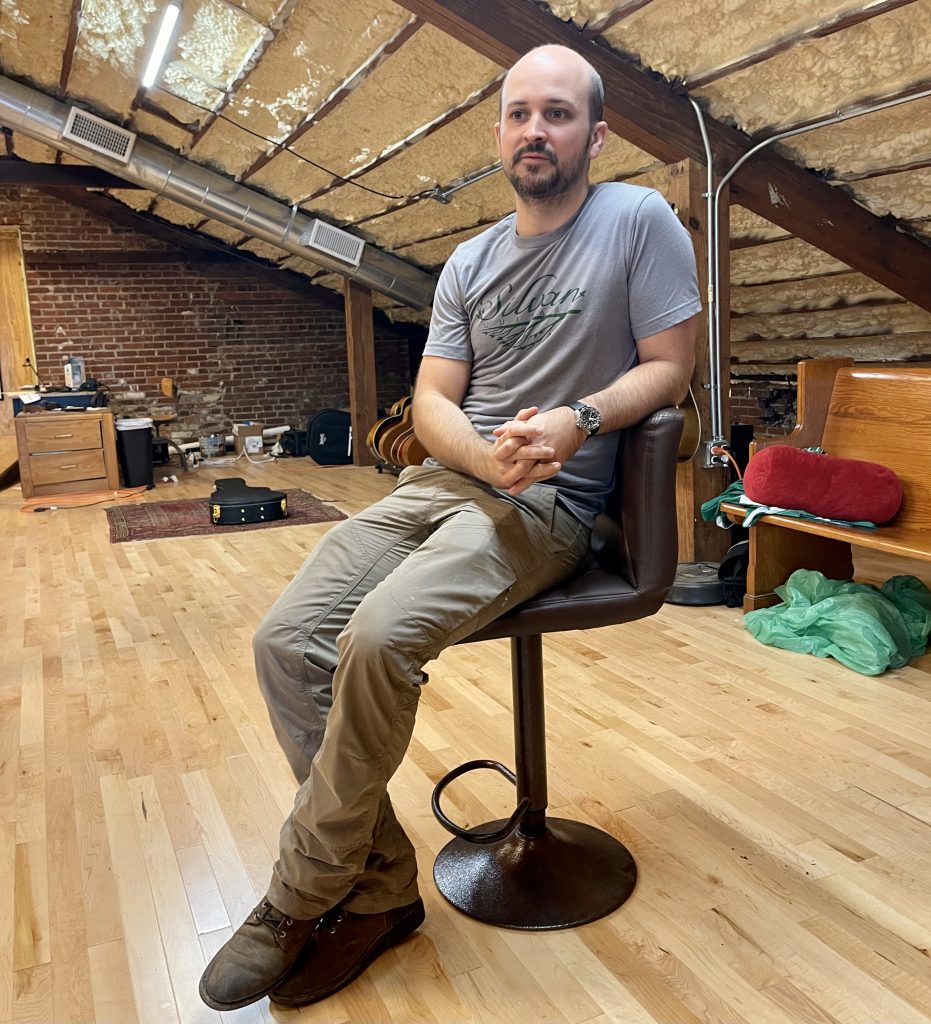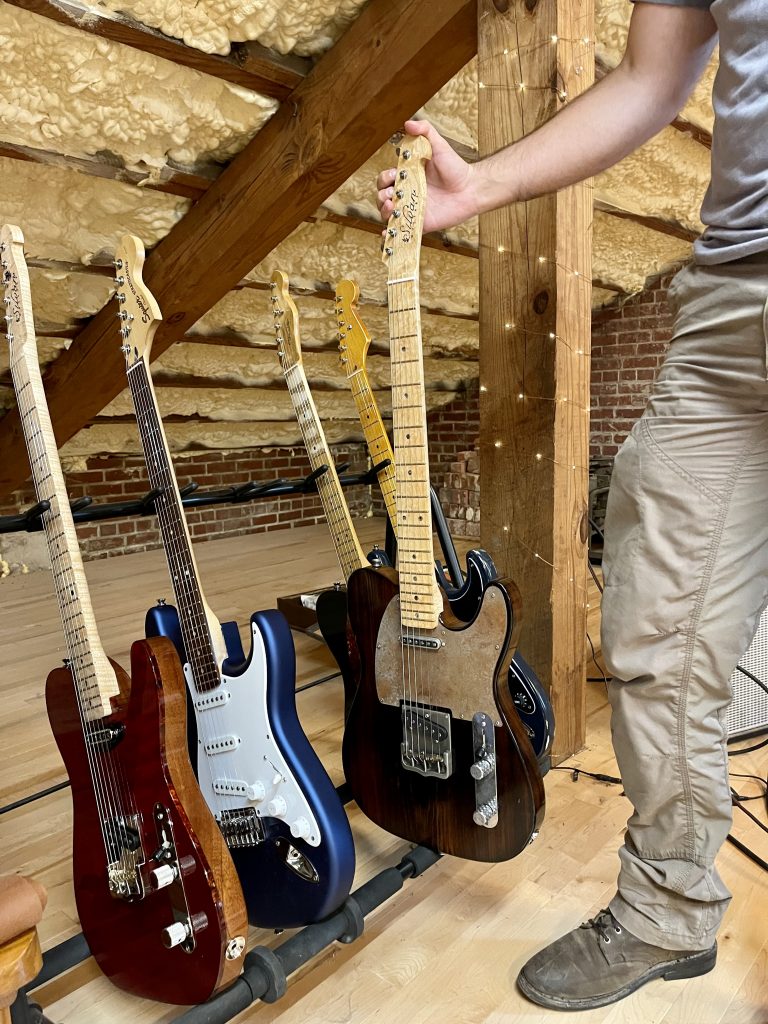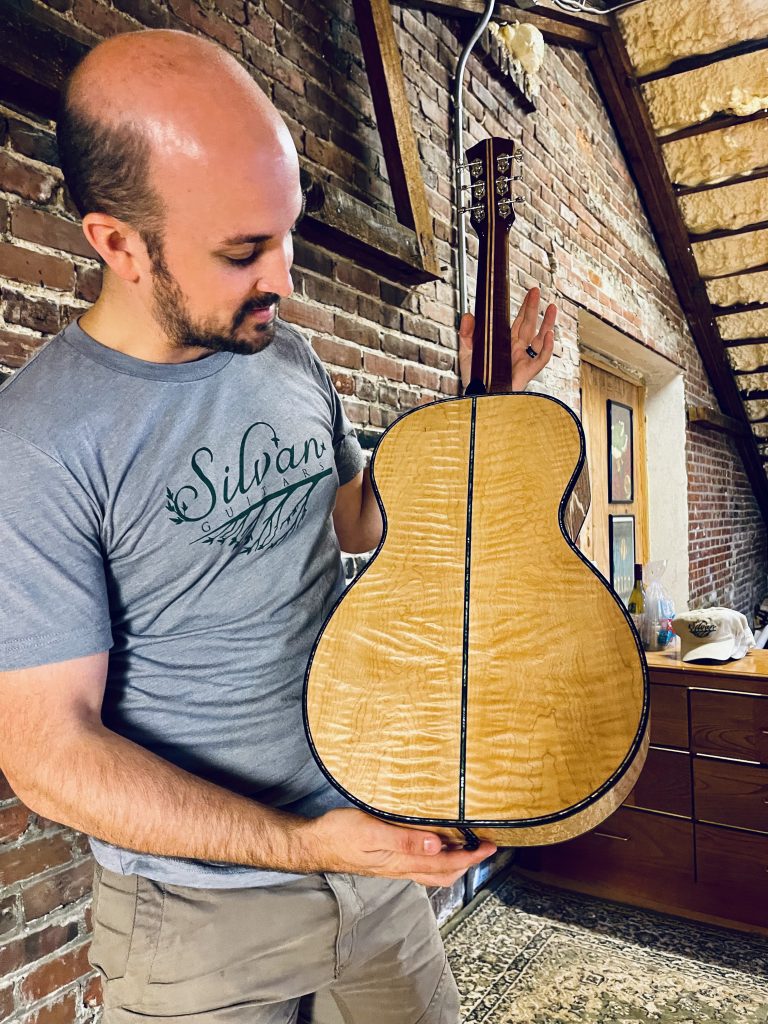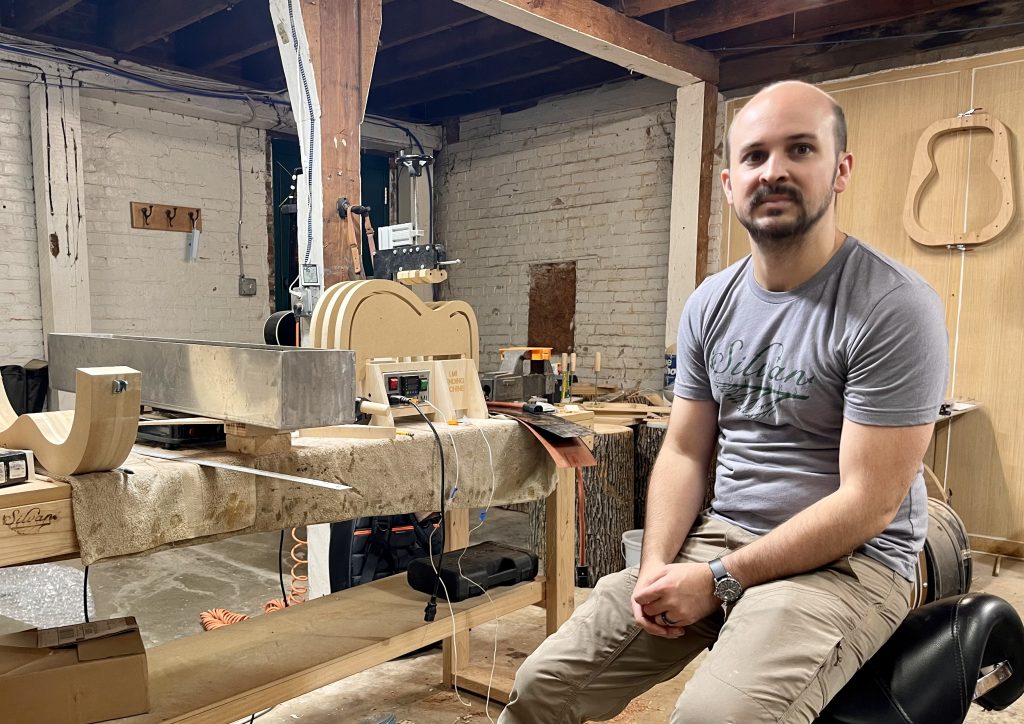
What led you to the life of a luthier?
“A desire to not go to more school. I went to the University of Georgia. It was May and I was about to graduate with a psychology degree but I in no way wanted to go to graduate shool, which is your option with a psychology degree.
So I was trying to think of something to do. I had been playing guitar for a couple of years and I wanted some work done on one of my guitars. I literally looked it up and saw where there’s a place in town that also had an apprenticeship program. So I just kind of jumped on it.”
What qualities make for a good luthier?
“Patience. Attention to detail.
A day-to-day thing for me is: ‘How are things I’m working on now going to impact the final product?’ An understanding of all of the geometry that goes into what makes a guitar play well, sound good, all those things.
It’s tnal product in mind, what you’re doing now, and not taking shortcuts. That’s what makes a difference.
I don’t mean shortcuts so much as I mean,I’ll be working on something and I’ll think to myself, ‘Oh, it’s probably fine.’ I immediately stop myself and go, ‘No, you need to go back and re-look at everything to make sure that when you’re done with it, you go, ‘This is perfect.’
A lot of it is that we’re dealing with 1/64 of an inch, 1/128 of an inch. Which is so tiny but makes such a big difference in the long run.
It goes back to patience. The slower you go, the better it is for you. If you have steady hands, you can whip right through it. But if you cut too far on something, or take away too much material, there’s no going back.”
What qualities make for a good acoustic guitar?
“There’s three major divisions. There’s playability, tone, and aesthetics.
Does it play well? Is it easy to play? Does the string tension feel right?
Part of the playablity is also the comfort level when you’re playing it. For smaller people like me, I don’t like being wrapped around a giant guitar. So a lot of the guitars you see around here are much smaller bodied, because I’m trying to show people you can get a really nice, full tone out of a smaller bodied guitar.
The tonality,of it … I like something that rings really nicely. I like more low-end on my stuff. In the past 10, 15 years, there’s been a skew toward a brighter acoustic guitar. I like to sit on the other side of that a little bit.
The last one is aesthetics, which is a lot more subjective. Sometimes it’s the utter simplicity of it. Sometimes it’s the vintage look of it, or even the original look of a vintage guitar. Sometimes it’s something new and totally different.”

Tell me about the Damcaster. Isn’t that guitar line what you started off with?
“That was a project that began when I was still living up in Athens after I left the apprenticeship. I had a guy form here, Jason Burr, call me, and he had the idea for the Damcaster. He had building a little bit on his own and asked me to help him out with it.
Me, being native and not business minded, I jumped right into it. I didn’t think of it in a longer term. More like, ‘This will be fun for a little while.’
I didn’t see the benefit of the whole story. I came to learn that as we went through it. Those are great guitars.”
It’s modeled on the Fender Telecaster, right?
“Correct. It’s a Telecaster body.”
Which is typically electric. Are these electric?
“They are. Because it’s Georgia longleaf pine.
The trees were born in the 1400s and cut down in 1856, so there was no treating the wood or anything. They cut those trees down and plopped them down right down in the river.
So the wood’s really heavy and dense but that kind of pine would not make for a good acoustic because:
A) It’s too old.
B) It wasn’t dried properly.
C) Pine doesn’t really have the right tonal properties for an acoustic.”
We’re sitting up here where you had the Silvan Sessions. It’s got to feel good having live music coming back.
“It’s going to be really nice.
We had the first concert up here 2 ½ years ago. We started the Silvan Sessions project last February. We had a great show with the Shelby Brothers. It was just an amazing night. Then Wolf & Clover played probably the last live music show in town. It was on St. Patrick’s Day, which was 3 days before the shutdown.
There was a lot of hype going into it. I was really excited to get it started — I had a whole year’s worth of shows booked. We had to turn all that back so it’s really exciting to get back into it. We’re having Colin Manskar in here on June 24 with his whole band. That will be a great rock show. He’s playing his new album all the way through.
I have all those shows scheduled before COVID and I’m slowly rescheduling those. I’m trying to bring in some new people and different kinds of music so it will be a never know what you’re going to get kind of thing. There’s so many great singer-songwriter type people here in Columbus but I don’t want to do too much of that all together. So I’m trying to break things. up.
I’m really excited for Velvet Cab, a local band. I think they’re going to put on a great show. They’ve got great tunes but they haven’t broken through the live-music stage yet. I’m excited to put in my part there.
Jontavious Willis is going to do one, too. That’s going to be awesome.”
What do you foresee as the future of Silvan Guitars?
“Well, in a way, you’re looking at it.
I’m finally able to introduce some new electric models. I’m really excited about that.
I’m pretty happy with how my acoustics are being built now. The tone on the acoustics is mostly where I want it to be. I’m happy with the aesthetics and playability of it. But there’s obviously always room for improvement.
I recently built a couple of classical guitars — that was very different. It made me go back and re-look at how I was doing things and adjust.
If I could spend all my building customs and putting those out there in the world, that would be the goal for me in the long-term.”

and enjoy insight and info only available in this full-length recording of the Q&A.
Age: 31
Hometown: Columbus, Georgia
Education: Brookstone School (13 years). University of Georgia, B.S. in Psychology
Favorite guitar riff: “Moby Dick” – Led Zeppelin
Favorite guitarist: “It changes all the time, but if I’m forced, I would have to say Dave Matthews.”
Worst thing about the Columbus music scene: “The lack of venues.”
Best thing about the Columbus music scene: “The amount of people who are really excited about doing their own music — live music, original music. We have a great breeding ground for musicians and it’s a very open and welcoming environment. It’s a lot like Athens — everybody plays with each other. I think that’s really good because everybody has a stake in how other people are doing. If we could just get that middle-sized venue, something between the Loft and the RiverCenter. When that happens, I think they have the ability to take our scene and knock it out.”

